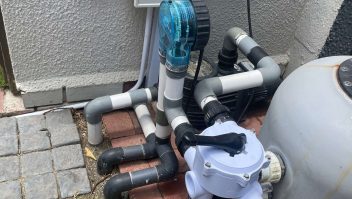Calcium hardness is an important factor in maintaining pool water balance. If your calcium hardness is too low, your water can become corrosive, potentially damaging your pool surfaces, equipment, and plumbing. If it’s too high, the water may become cloudy, and you might even experience scale buildup on the pool’s surface. The Calcium Hardness Calculator is a tool that helps you determine how much calcium chloride to add (or water to replace) in order to keep your pool water at the ideal hardness level.
What Is Calcium Hardness?
Calcium hardness refers to the amount of dissolved calcium in the pool water. It’s crucial for the following reasons:
- Prevents corrosion: Low calcium levels can cause the water to “eat away” at pool surfaces, equipment, and plumbing.
- Prevents scaling: High calcium levels lead to cloudy water and scale buildup on tiles, pumps, and heaters.
- Balances water chemistry: Proper calcium levels help maintain the stability of the overall pool chemistry.
Ideal Calcium Hardness Range
- Recommended range: 200–400 ppm
- Levels outside this range can cause problems with your pool’s appearance, feel, and equipment longevity.
How to Use the Calcium Hardness Calculator
You’ll need:
- Pool volume in litres
- Current calcium hardness level
- Desired calcium hardness level
- Type of product: Calcium chloride (for raising levels)
Sample Dosage Guide (for a 50,000L pool):
- To raise calcium hardness by 10 ppm:
- Add approx 500g of calcium chloride
Always dissolve calcium chloride in water before adding it to your pool.
How to Add Calcium Chloride to Your Pool
- Test your current calcium hardness level (use a calcium hardness test kit)
- Calculate the amount of calcium chloride needed using the calculator
- Add gradually with the pump running and ensure proper water circulation
- Retest after 24–48 hours to ensure the levels are within the optimal range
Maintenance Tip
It’s important to monitor calcium hardness regularly, especially if you’re in an area with high mineral content in the water supply. Water replacement may be needed if your hardness levels become too high to adjust chemically.
Internal Links
- Pool pH Calculator: How To Get Your pH Level In Range
- Pool Salt Calculator: How Much Salt Do You Need to Add?
- How to Maintain Your Pool
External Link
FAQ Section
1. What happens if my pool’s calcium hardness is too low?
If calcium hardness is too low, the water can become corrosive, leading to damage to pool surfaces, equipment, and plumbing.
2. What happens if my pool’s calcium hardness is too high?
High calcium hardness leads to cloudy water, scale buildup on pool tiles, heaters, and pumps, making it harder to maintain water clarity and balance.
3. How often should I test calcium hardness?
Test calcium hardness at least once a month or after heavy rainfall, water replacement, or other significant changes in pool conditions.
4. Can I use calcium chloride to lower calcium hardness?
No, calcium chloride is used to increase calcium hardness. If calcium levels are too high, you will need to partially drain the pool and refill it with fresh water.
5. How much calcium chloride should I add?
Use the Calcium Hardness Calculator to get an accurate dosage for your pool size and current calcium level. Typically, for a 50,000L pool, it’s around 500g to raise the level by 10 ppm.
With the Calcium Hardness Calculator, you can keep your pool’s calcium levels perfectly balanced, protecting both your pool and your investment. If you need help maintaining proper calcium levels or need further guidance, contact Pools Reno for professional pool services and advice in the Western Cape area.



